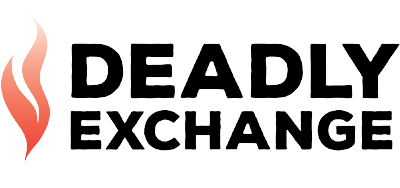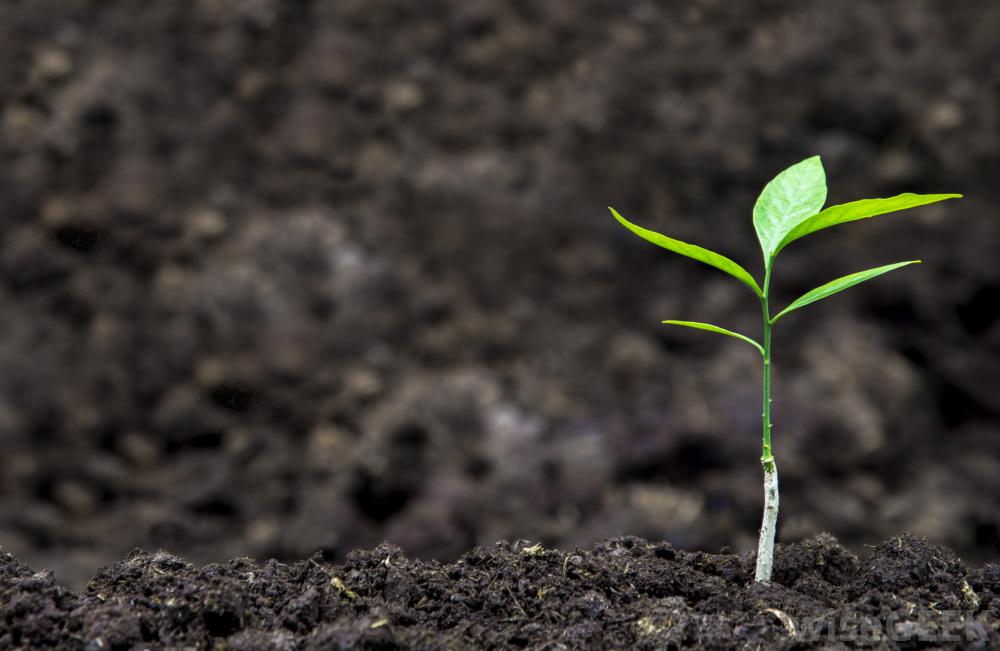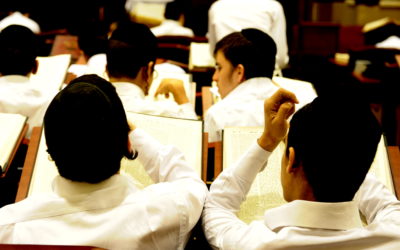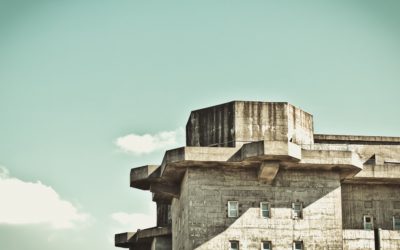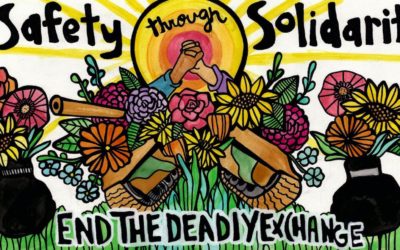Imagining the World to Come
Calling for submissions exploring safety & abolition in Jewish communities
JVP has launched the Deadly Exchange campaign to end police partnerships between the US and Israel, and to ask us all: How do we achieve real safety?
As a part of this visioning, we invite you to submit an art piece, poem, critical analysis, textual study, or historical observation on the theme of abolitionist Jewish communities.
We hope the text and questions below provide a spark to help you think about this – we invite you to make these questions yours.
What do we mean by abolition?
According to Critical Resistance, prison abolition is a “political vision with the goal of eliminating imprisonment, policing, and surveillance and creating lasting alternatives to punishment and imprisonment.” It is a vision because policing, surveillance and incarceration structure so much of how we think about justice and accountability, what happens after someone is harmed, that we have to test our imagination to think of alternatives to these systems. The concept comes from Black freedom struggles, and is named “abolition” as a direct parallel to the abolition of slavery – another racist, violent system that, at one time, felt impossible to end.
Because of this, the hardest work of abolitionist practice is the work of imagination. Can we imagine a Jewish community without security, policing, or military protection? What would that look like? What would need to be different – within our communities or within the world at large – to make it possible?
What do we mean by “Jewish communities”?
A question with maybe 6,000 years of thought behind it, we would like to approach “Jewish communities” in a broad way, and encourage imaginative perspectives on the terms & the concept. This can mean:
- The institutional Jewish community; the Federations, community centers, or Jewish organizations like the ADL, Bend the Arc, AIPAC, JFREJ, JVP
- Chavurah, as a concept & practice
- Your synagogue
- Your childhood synagogue
- Your family
- Everyone in the world who practices Judaism
- Everyone in the world who has some Jewish heritage
- How you first came to understand “Jewish community” (if at all): the Zionist summer camp? Birthright? The anarchist affinity group? Your study group as you were preparing for conversion? Your non-Jewish/interfaith family, friends, partners?
- Radical and alternative communities
- Communities that emerge between Jews and non-Jews, from Mimouna to the communities forged in co-resistance
Taken together, we want to know – what would an abolitionist Jewish community look like? What would it take to get there?
What would be different about it than the Jewish communities we currently have? What kinds of investments do we, as Jewish people, have in security and safety, and are they truly making us safe? What would it take to make our communities spaces of true safety and belonging for all?
What would a world without police, jail, detention, ICE, security, extrajudicial executions, shoot-to-kill policies, racial profiling, massive spying and surveillance look like for our Jewish communities? How can we change our communities and ourselves to make that world more possible?
What could Jewish politics be in the moment of Black Lives Matter?
We invite you to think about how this moment of collective struggle – the struggle for Palestinian self-determination, Black Lives Matter, Native sovereignty struggles like NoDAPL – help define our current moment of political possibility, and how Jewish communities, broadly defined, can join in co-resistance with those movements.
Submissions that explore the term “Jewish community” itself are more than welcome.
We are specifically looking for submissions that:
- Think about race in the Jewish community, especially in relation to policing.
- Think critically about hate crime laws as a response to antisemitism
- Investigate different Jewish communities in history, and their approach to policing and/or safety.
- Take on, or provide alternatives to, Zionism’s understanding of safety and security for Jewish people.
- Explore how themes of “safety” and “security” impact the “Jewish community’s” understanding of interfaith relationships and families.
- Explore the fears, anxieties, or hopes that come up around the themes of abolition and Jewish community.
- Think concretely about how to imagine an abolitionist future for our Jewish communities.
- Explore the challenges of abolitionist thinking and practice for Jewish people and communities.
- Explore what kinds of coalitions, joint struggles, and solidarities would emerge if we took on this collective visioning
- Interview activists in the prison abolition movement.
- Think through how can we use this vision to challenge Islamophobia, in the Jewish institutional world and beyond. How does our attachment to policing, incarceration, or security feed Islamophobia and the scapegoating of Muslims?
Submission Guidelines:
Think pieces/dvar torah/other forms of text: Please keep your submissions to 1000 words or less. Submissions can be historical, textual, and/or philosophical analysis; poetry, fiction, or prose. They should be written for a general audience. Citations should be weblinks whenever possible. If you have an idea to submit but are unsure if it fits, please contact tallie@jvp.org.
Art pieces: All genres of art pieces and videos, including images, films, and documentaries, are welcome. Please include a brief artist statement with your submission. Whenever possible, please submit high-resolution images.
Please send your submissions to Tallie at tallie@jvp.org.
Please include your affiliation with JVP with your submission (ie, Council and/or Caucus membership).
Pieces will be available online, as part of the this website. Your work must be your own, original work, and by submitting, you are allowing JVP to publish it online.
READ MORE
Imagining Abolition with Haredim
By Ben Ratskoff Because Haredi communities have historically detached their work in Jewish law from the carceral Israeli state, their perspectives on incarceration seem worth exploring in order to imagine alternative political visions of...
Abolishing Prisons and Ending Racism
How to think and what to do about race in order to abolish prisons By Anonymous In 2010, I had a 4-month long psychotic episode during which time I broke several laws, including public disturbance, shoplifting, stalking and whatever it is...
Imagining the World to Come: An Introduction
At JVP, we work hard to imagine a different future for Palestinians and Israelis, one without walls, checkpoints, home demolitions, and child detention. One where everyone has freedom of movement, access to clean water, the right to live and worship as they please.
